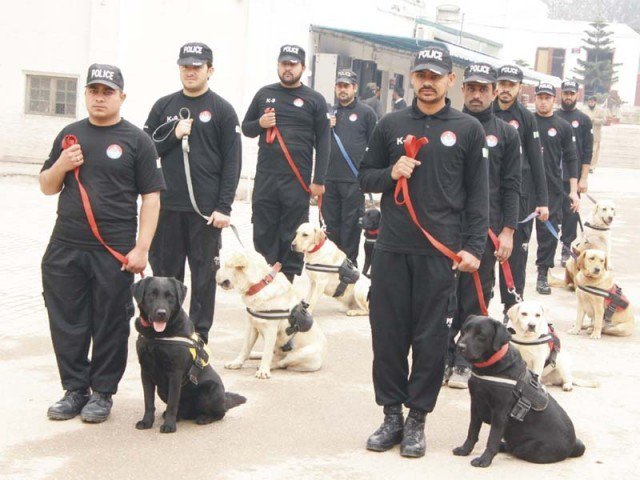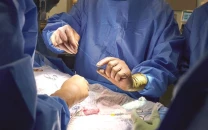Police dept’s sniffer dog programme gaining momentum
15 new canines to help combat criminal elements in the field

Representational image. PHOTO: FILE
The dogs will come in all colours and sizes, but the preferred breeds for police work, as with most law enforcement agencies across the world, are German shepherds or Labradors.
The four-legged creatures will be trained by retired trainers of the canine centre of the army. They were previously engaged by the Special Branch before formally making them a part of the canine centre.
A senior trainer tells The Express Tribune that the Special Branch is the first department to establish a school for sniffer dogs in 2010 after the Pakistan Army.
K-9 unit sniffing out terrorism in K-P
He shares almost every all VIP movement or public event is inspected by the Special Branch’s Canine Centre in case of a possible terrorist attack or threat.
An expert affiliated with the Kennel Club of Pakistan, Kamran Iliyas, says no organisation has the certification or skill to train sniffer dogs other than the Pakistan Army. “The training requires exposing the dogs to explosives, which is not permitted according to the law.”
However, there are a few trainers available who have trained puppies, albeit illegally. He adds the price of a puppy varies from Rs25,000 to Rs0.15 million, depending on the breed of dog.
Special Branch Additional IG Zaem Sheikh says the new recruits have been purchased from the University of Veterinary and Animal Sciences. He adds the department engaged retired employees of the Pakistan Army for training purposes. The officials have been hired through the Punjab Public Service Commission and there are more than 100 trained sniffer dogs at the Special Branch Canine Centre.
Training
Another trainer shares with The Express Tribune that the sense of smell of a dog is 1,000 to 10 million times more powerful and sensitive as compared a human being, again depending on the breed. This is the basis for training them for the purpose.
Man's best friend: The dogs who sniff out explosives in Kabul
A dog can be trained to detect a certain material and the process begins from the young age of seven months for the puppy
He adds the canine receives general training for two years. Later, a dog is evaluated to determine its skills in different areas, for example, explosives and narcotics detection and disaster response. After evaluation, the animal is engaged in specialised training.
However, not all dogs are fit for special training and these animals are kept for guard duties or in the reserve force. “If a trained dog falls ill and requires blood transfusions, a reserve dog is used for the purpose.”He adds that each dog had a specified handler who is as important during search-and-sweep operations as his four-legged partner. The handler needs to be familiar with the behaviour of a sniffer dog for better results.
He adds that if the handler is changed, it takes at least two months for another handler to become familiar with the dog.
“A trainer must learn to identify the dog’s moods, needs and problems. The handler is asked to monitor the dog’s responses during operations in the field.”
He asserts that a trained dog usually does not make a mistake during detection. If there is one, it must possibly be a mistake on the part of the handler rather than the dog.
Published in The Express Tribune, August 7th, 2019.



















COMMENTS
Comments are moderated and generally will be posted if they are on-topic and not abusive.
For more information, please see our Comments FAQ